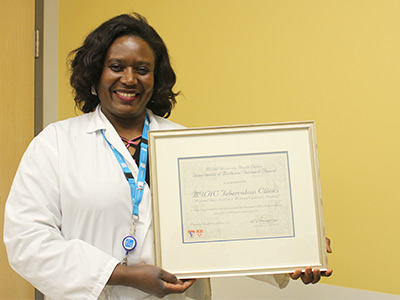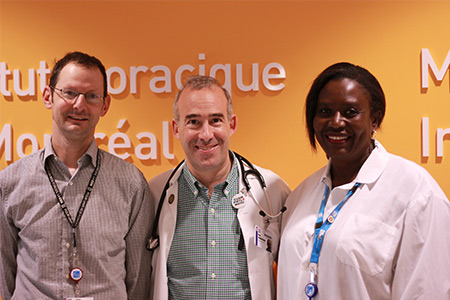MCI TB Clinic staff travel near and far to help patients manage tuberculosis
In 2012, when a tuberculosis outbreak plagued a small Inuit community in Nunavik, in the northern region of Quebec, Amélie Fosso, clinical nurse specialist at the outpatient Tuberculosis (TB) Clinic of the Montreal Chest Institute of the McGill University Health Centre (MCI-MUHC), immediately volunteered to be part of the Montreal team that was deployed to assist the community.
“I wanted to help and to get to know the Inuit communities better, because they are part of our clientele at the outpatient TB Clinic in Montreal,” she says. “It was an enriching experience, in spite of the difficult circumstances.”
TB is a major concern in Canada’s northern communities and remains a serious threat to health around the world. It affects more than nine million people every year and is the number one cause of death by infection worldwide, killing 1.5 million people a year. Managing a TB outbreak is a complex endeavour and requires the collaboration of medical and nursing experts, patients and community members.

Tuberculosis generally affects the lungs and can be highly contagious, so diagnosis and management must be undertaken quickly. MUHC Respirologist Dr. Faiz Ahmad Khan is the Director of TB Clinical Services at the MCI. He travels to Nunavik two to three times a year as a medical consultant for tuberculosis and other pulmonary diseases. He notes that while Nunavik has a very high rate of TB, every year there are also a number of sporadic outbreaks that occur in the rest of Quebec, including in and around Montreal.
“When the infection is inactive, TB isn’t contagious, and there are no symptoms. We can treat the patient to lower the risk of developing active TB,” he says. “However, once it transitions from inactive infection to active disease, TB can be transmitted to others and can also be a life-threatening illness. It’s essential to trace all the people a patient with active pulmonary TB has come in contact with.”
Another key element to successfully manage TB is to ensure that patients get the appropriate treatment and follow it for several months, and without interruptions, to the end, something that’s easier said than done, according to Dr. Ahmad Khan.
“People have their everyday lives to live, and it’s challenging for them to be on a treatment that needs close follow-up for many months. Fortunately, our dedicated nurses and our social worker are specialized in the management of TB: they support patients in taking their medications, visit patients at home, interact with the Public Health Department and advocate for patients. They’re at the core of the strength of this clinic, along with our physician experts.”
Stigma still present
Amélie and her colleagues – clinical nurse specialists Denis Francis and Octavian Boitor – work on different levels to mitigate the strong impact of TB on patients and families. Most importantly, they emphasize patient and family education as a means to develop trust and gain adherence.
“Our role is to reassure people and to give them the facts about TB: what it is, how it spreads, how to treat it, etc. We establish close ties with patients and their families and adapt interventions to their profile. If they have a good understanding and are reassured, it becomes easier to manage the disease.”
Education is also essential to fight the stigma associated with TB which is still very much present nowadays, says Amélie.
“People diagnosed with active TB must be isolated from their work, school and social environment for a period of two weeks to a few months and may face rejection from colleagues, friends and even family members”, she says. “Some employers refuse to take back employees who had TB, because they don’t want their work environment to be associated with the disease. That’s why it’s essential to educate the community and offer patients psychological support.”
Whether they’re sharing nursing and medical expertise to help with TB outbreaks in the North – Amélie went back to Nunavik a second time in 2013 – or caring for and visiting patients and communities in Montreal, all members of the staff of the MCI TB Clinic strive to bring the fight against TB out of the shadows and into full view to help patients take control of their condition and to mobilize communities to show compassion for people with TB.
Five things to know about the MCI TB Clinic
The Montreal Chest Institute Tuberculosis (TB) Clinic is a major referral centre in Montreal and across the RUIS-McGill territory, which stretches over half the area of the province of Quebec. Dr. Kevin Schwartzman, who is a respirologist and director of the MUHC Adult Respiratory Division, lists some key facts about the TB Clinic.
- We deliver complex care to patients and families and treat severe forms of TB which are becoming more prevalent throughout the world: drug-resistant TB, multidrug-resistant TB and extensively drug-resistant TB.
- We work as consultants in close collaboration with Quebec’s Director of Public Health to help keep outbreaks under control.
- We collaborate with Immigration Canada, evaluating immigrants and refugees coming from countries where TB is widespread.
- We work as consultants in respiratory medicine and tuberculosis in Nunavik, the northern region of the province of Quebec, where in 2011 the rates of TB infection and disease were several fold higher than in the rest of the province.
- We’re a focal point for TB research in Montreal. Our integrated TB research program means that results from ongoing research and clinical trials can be immediately integrated into our practice. It also means that we can focus our research efforts on key questions that come up as we treat TB in our patients, and strive to prevent it in our communities.
